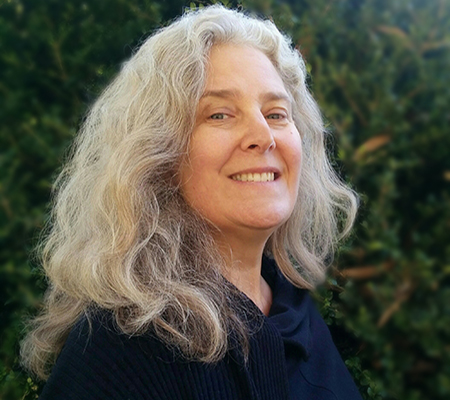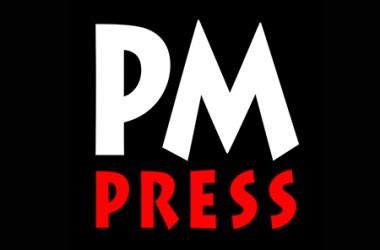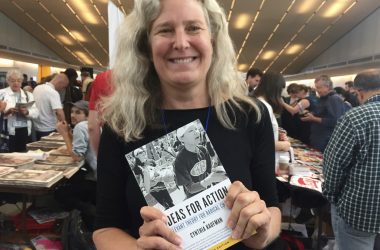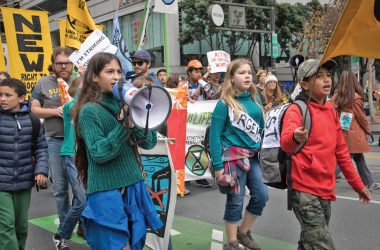By Cynthia Kaufman
Talk given to the California Student Sustainability Coalition’s annual convergence
De Anza College Saturday May 21, 2016
We are at a time when we will probably see an increase in the use of civil disobedience, direct action and disruption. That’s because we are at a time when our political systems are increasingly controlled by corporate power and not responsive to our needs and the needs of environmental sustainability.
Direct action means you are taking your action directly to where that problem is caused and you are getting in the way of it. Direct action cuts through processes of political representation. Generally we engage in disruption when slower processes like dealing with elected officials to regulate environmental problems are not working.
I do want to say that at least in California a lot is being done at the level of regulation: AB 32 which was passed in 2006 did a huge amount to regulate greenhouse gas emissions in California. When it passed, it was one of the strongest pieces of climate legislation in the world. And it has inspired many other municipalities to act.
This year there were 4 major climate bills in the California state legislature. One called for a 50 percent increase in energy efficiency in buildings. Another required the state’s pension systems to divest from coal. A third required California to get 50% of its electricity from renewals by 2030. The fourth called for a 50% reduction in petroleum use in cars. The first three of those bills passed and the fourth did not.
The one that was defeated was targeted with massive lobbying from the fossil fuel industry. That is the sort of power that we need to disrupt.
Sometimes activists who are attracted to being rebels and engaging in disruption are dismissive of activists who play the quiet inside game of pushing for better legislation.
I want to say that the people who worked to get those four bills to move forward deserve our appreciation. It is crucial that was we fight for sustainability we get as much synergy as we can to happen between those inside players who are working on changing the rules of the game, and those of us who are working on the outside to pressure the system to change the balance of power, and open up new possibilities for us.
Besides the bill for redesign petroleum use in cars and trucks, the other big climate failure we have had in California is a failure to stop fracking in the state. When our environmental and social justice needs come up against vested interest and those interests fight hard we lose if we only use insider lobbying strategies.
This was also true for the fight against Keystone KL pipeline. President Obama postponed action for years, checking which way the political winds were blowing.
Thousands of activists got arrested at protests and the movement to stop the pipeline worked. Those protests completely changed the changed Obama’s political calculation.
The use of disruption to take direct action to protect land is happening all around the world, and especially in indigenous communities fighting to protect their land. It is happening in Oakland as protestors are trying to stop a coal transport facility from being built at the harbor. Blockading is a place based strategy and it can be very effective.
When I was twenty I was involved with the movement to stop US support for the dictatorial government of El Salvador. We didn’t engage in civil disobedience to stop the policy of support for the dictatorship. That is an abstract goal, and it requires different tactics. We used direction action, though to stop the shipment of arms from the weapons depot in concord California. We sat on the tracks, and refused to let the trains go through that were carrying the munitions.
The only other time I was arrested for civil disobedience was in protest of the police being acquitted for beating Rodney King in 1992. Following the acquittal there were protests all around the country and in San Francisco, where I lived, the city decided to outlaw protest. So we protested that. That was a spontaneous arrest.
I learned a few lessons from those two experiences with civil disobedience.
The first was to be aware of the power of the estate. The first time I was arrested many of those who were involved with the civil disobedience movement talked about how the power of our solidarity would melt the power of the state. When I was in jail, and not able to get any food that was appropriate for me as a vegetarian, and when I was locked behind bars and not able to leave, it became quite clear to me that the state was seriously more powerful than our solidarity. If you engage in disruptive tactics and plan to get arrested, be aware of what you are up against and the reality of the consequences.
The second lesson I learned was that it is very important to be organized. Jail solidarity e is a concept people learn in civil disobedience training. It is the idea that you have some power in your numbers. The government doesn’t want to use the resources it talks to take care of you all. The second time I got arrested there were people in jail for whom it was their third arrest in that set of actions. The police wanted to let those of us who were first timers to go, so they could deal more harshly with the repeat protestors.
Some of us tried to organize and ask people who were first timers to refuse to leave until they let the repeat protester out first. We wanted to engage in jail solidarity. Unfortunately since it was a totally spontaneous protest, we had prior relationships of trust, and no culture of being organized in jail, and the most of the first time arrestees left first. Civil disobedience is no joke, and being organized and prepared will make your actions much more powerful.
Direct action can be really exciting: for once you are not going along with the system and playing by its rules. You are making up your own rules and you are doing it together in a group, and because of how dependent you are on each other, can forge deep and lasting relationships. I know many people my age and older who belong to affinity groups that got together around some civil disobedience actions who years later still do political work together.
One of the reasons we need to engage in disruptive action is that what we are up against is not simply a lack of knowledge on the part of consumers, or a few bad rules and laws leftover from before people know about climate change. Rather we are up again entrenched systems of power that have no intention of giving up their ways of doing things.
One of the most important forces for environmental destruction right now is the fossil fuel industry. And because of the ways that capitalism allows those with money to have tremendous amounts of political power, that industry has enough power that it is a challenge to get them to change their ways. The US government still subsidies that industry with millions of dollars to support “research” and the government is very slow to regulate the industry because of the power it wields. That power is mainly the power to donate to electoral campaigns. That nexus of money and power is the core of what we call capitalism.
Capitalism allows all kinds of social power go to those who have capital, and it allows important social decision to be made by markets and those markets are shaped by the interest of those with capital.
Having a world awash in capitalism means that goods are produced in in ways that serve the interests of capital but not of people. We get lots of thing made to break and need to be replaced quickly. We have mining companies destroying habitat all over the world, and displacing people who live on the land.
Berta Cácares the Honduran activist who was murdered last month was fighting to save her community’s land from being destroyed by a dam project. In 2008 a progressive Honduran government was overthrown by a pro-business coup. That coup was supported by Obama and Hilary Clinton as Secretary of State. (And yet I do still hope you vote for her if she gets nominated because the lesser of two evil really is less evil.) It was that coup government that murdered Cácares.
US
foreign policy is largely motivated by the needs of multinational
capital, and the pressure for the dam was about the needs of industry
for electricity. So you could say that capitalism killed Berta Cácares.
For
some people when you bring capitalism into the conversation it means
that the possibility for real practical change in the present is
foreclosed.
In my book Getting Past Capitalism I take on the idea that the only way to get past capitalism is to wait until it is time for a revolution. Many anti-capitalists see capitalism as something like machine that needs to be broken, they talk about getting past capitalism as overthrowing it.
I see society more like a tapestry or an ecosystem. Capitalism is a big part of our ecosystem, but it is not the whole thing, and getting rid of it doesn’t mean throwing away what we have. Rather it means disrupting the capitalist parts of our society.
The time to get past capitalism is now, and the way we get there is by moving with powerful actions into disrupt the processes that reproduce capitalism. Bernie Sanders has done an important part of that by undermining support for the pro-capitalist Trans Pacific Partnership. And he has helped undermine capitalism by convincing large parts of the US public of the importance of public goods.
Our work in the climate justice movement, of getting in the way of the power that the fossil fuel industry has, and standing up to their ability to destroy the climate with impunity, is also a part of the fight against capitalism.
I want to urge you to take seriously the fact that we are fighting for the fate of the planet. That means, as you contemplate engaging in disrupting tactics that you keep your heads about you and you always remember to think strategically.
Don’t be motivated by the actions that are the most glamourous or fun or attention getting. If you get attention you need to think about how you will use that attention. Sometimes it is hard to see what the result of your actions will be, but if you don’t spend serious time thinking about that, you are likely to not accomplish very much.
Some of us, by temperament are attracted to more rebellious actions and some by temperament are more attracted to slow less risky work. I want to ask you to be respectful of the synergy between different forms of action, but I also want to ask you to be more motivated by the needs of the movement than you own temperament, to stretch yourselves.
At De Anza College, I teach community organizing, and one of my favorite concepts from community organizing is power analysis. With a power analysis you think about what the steps are that are necessary to move a situation from point A to point B. You don’t’ rage against the machine because you don’t like it. You don’t engage in civil disobedience because it is exciting. Neither do you back away from disruptive tactics out of fear. Rather you look the situation squarely in the eye and you ask what is needed. And you don’t shy away from the parts of that work that are boring, that require building support for your project that require technical research. You find ways to have your group do what needs to be done to make a significant change
Another one of my favorite concepts is escalation of tactics. The idea there is that you start a campaign by asking for what you want from power holders. When they don’t give you what you want you escalate your tactics. You build legitimacy for your action by engaging the public in the various steps, and by escalating as needed, but not before.
At De Anza I worked with a group of students who got our community college district to divest from fossil fuels. The students made an excellent presentation to the foundation board. The board’s first response was that they were only a group of 5 students, so they asked for student government resolutions. The students went back and did that. When they went back again the board it passed easily.
On other campuses they have gotten stonewalled and they have had to escalate to civil disobedience. We reach our goals when we use the right tools for the right jobs.
Doing the work you are doing for climate justice can be overwhelming. You can start to feel like the fate of the world is on your shoulders. I want you to be inspired and to see the small work that each of us does as part of a global movement for global justice.
When you feel frustrated and think that there is no way you can solve the world’s problems, I want you to remember that you as an individual can’t. Don’t kill yourself trying. You are not the messiah who will solve the world’s problems. That attitude will lead to burn out. I want you to be in the movement for social justice when you are older than I am. That requires pacing. Take a break if you need to to get through school, to have a good place to live, to have healthy relationships.
Thank you for dedicating yourselves to the collective project of keeping our planet habitable, and I wish you the best in building a life where you can do this work for the next 50 years, and where you can do the work in brave ways that make a difference.




